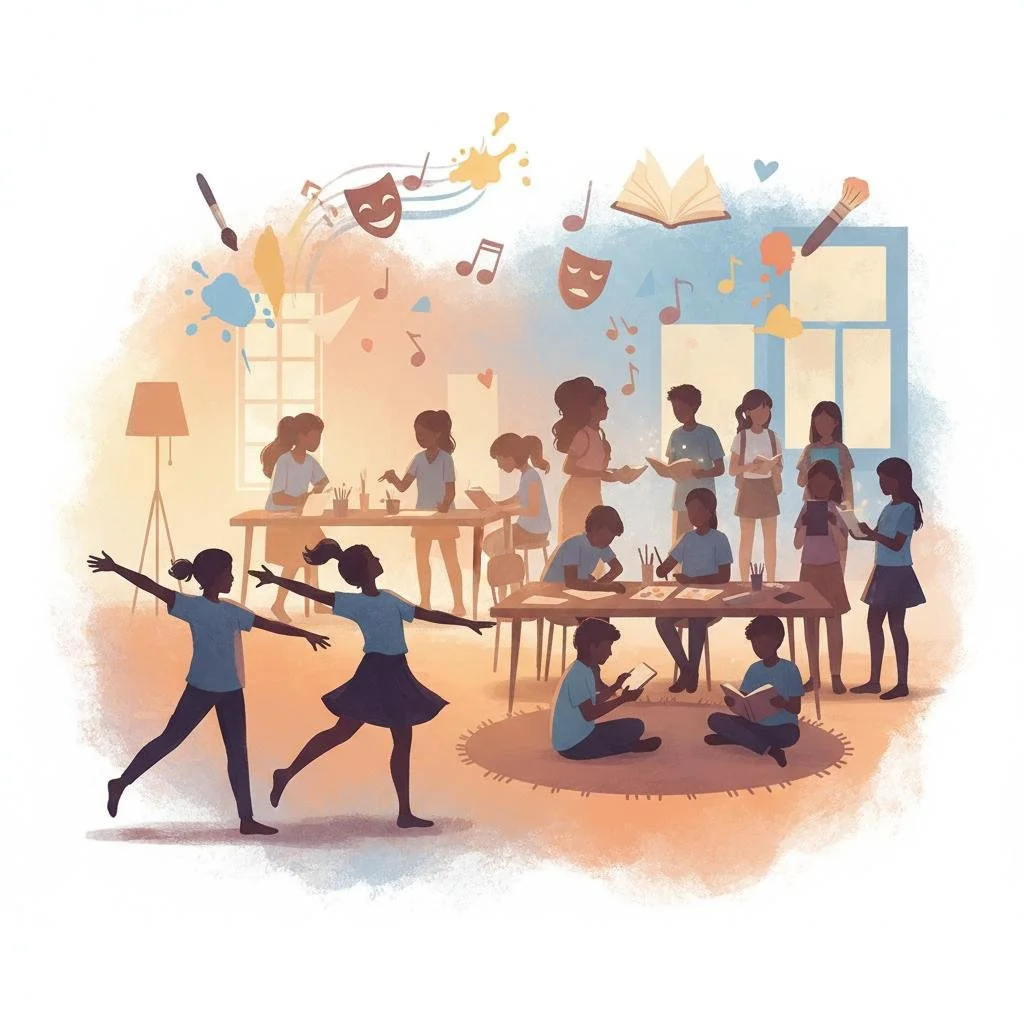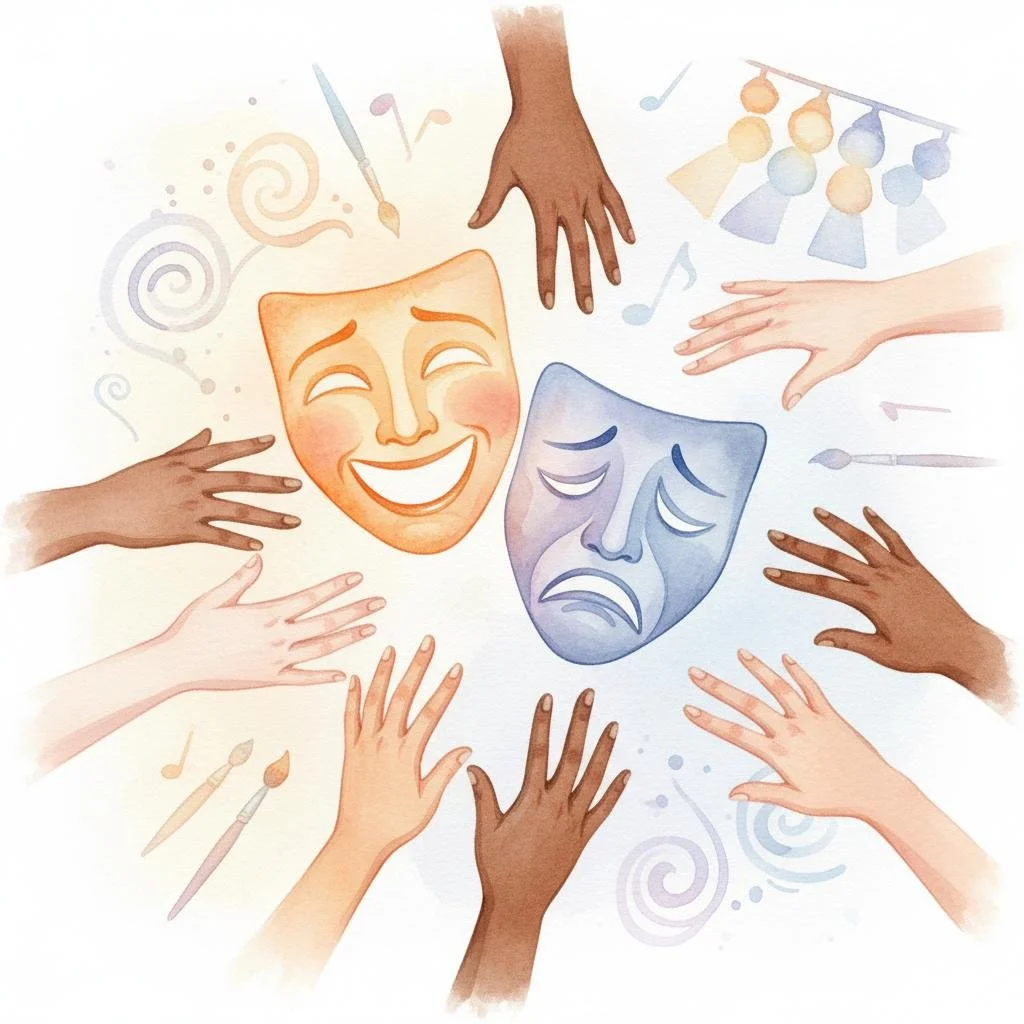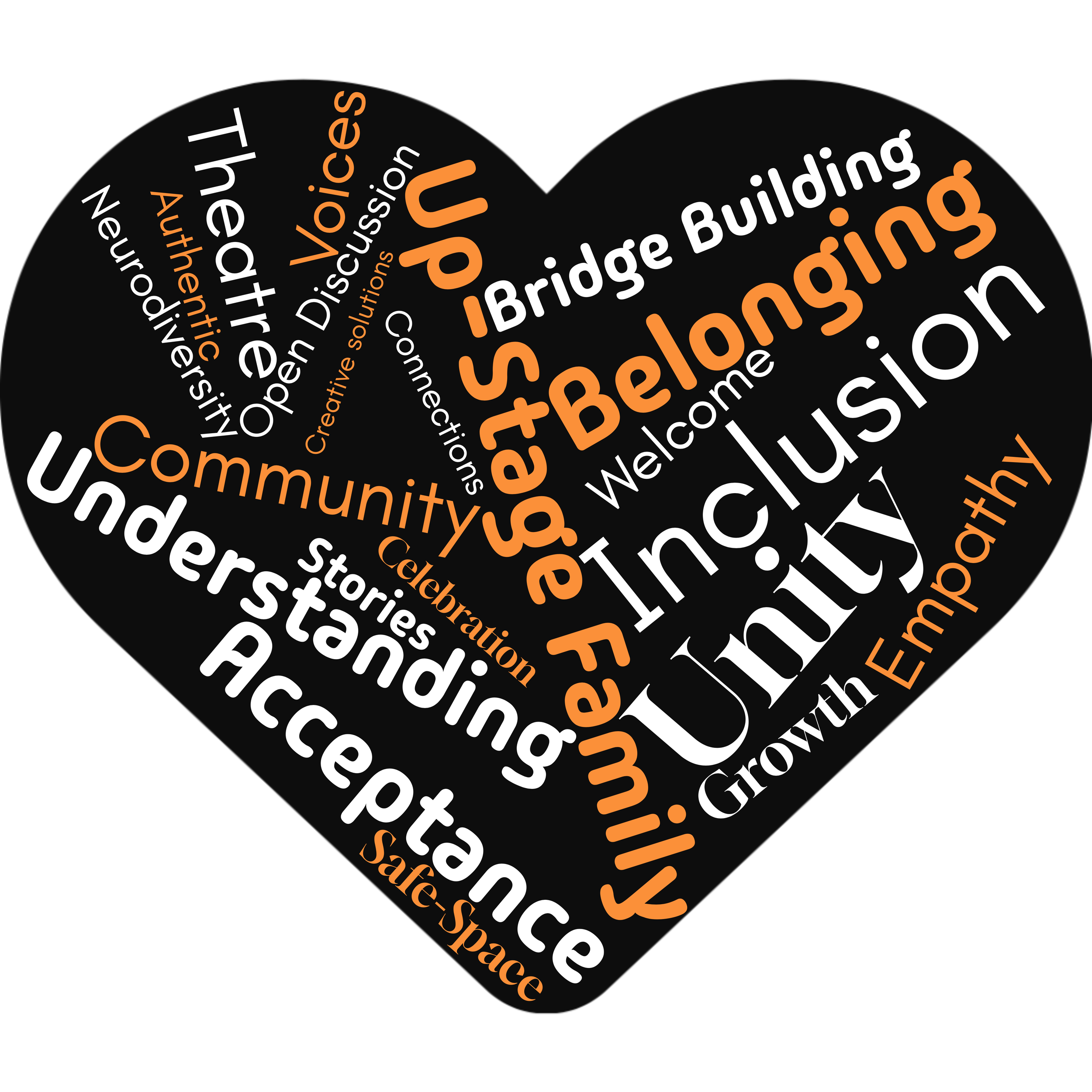
Creativity Deserves the Same Status as Literacy
“My contention is that creativity now is as important in education as literacy, and we should treat it with the same status.” — Sir Ken Robinson
If you’ve ever watched a child completely absorbed in play, you’ve seen creativity in its purest form. They invent worlds, solve problems on the fly, and express feelings they don’t yet have the words for. Sir Ken Robinson’s famous contention isn’t a “nice-to-have” idea for schools — it’s a practical, urgent reminder: if we treat literacy as essential, we must treat creativity the same way.
Because creativity isn’t just about painting pictures or putting on a show. It’s how children learn to think.
What Ken Robinson really challenged us to rethink
Ken Robinson spent years pointing out a simple truth: many education systems are built to reward one kind of intelligence — the kind that fits neatly into tests, worksheets, and right-or-wrong answers.
But real life doesn’t work like that.
Children will grow into a world that demands adaptability, collaboration, communication, and original thinking. The ability to generate ideas, try things, fail safely, and try again isn’t extra. It’s foundational.
Sir Ken Robinson. https://www.sirkenrobinson.com
Creativity and literacy: why they belong side by side
Literacy helps children interpret the world. Creativity helps them respond to it.
When creativity is treated as “less important,” children can start to believe:
There’s only one correct answer
Mistakes are something to avoid
Their ideas don’t matter unless they’re perfect
Confidence is for “the talented”
But when creativity is given equal status, children learn something powerful:
Their voice matters
Problems can have more than one solution
They can take healthy risks
They can express what’s going on inside
That’s not fluff. That’s resilience.
Why this matters for confidence and mental health
Many parents tell us the same thing in different ways: “My child is bright, but they’re anxious.” Or, “They’re shy — they don’t put themselves forward.”
Creative learning environments give children a safe structure to practise being seen and heard.
In drama, for example, children can explore big feelings through characters and stories. They can rehearse bravery, empathy, and communication — without the pressure of getting it “right.”
That’s one reason we believe drama can be genuinely life-changing: it builds confidence from the inside out.
What it looks like to treat creativity with equal status
Treating creativity like literacy doesn’t mean every child must become an actor, artist, or musician.
It means we give creative thinking the same respect we give reading and writing:
Regular practice (not just an occasional “treat” lesson)
Skilled teaching (not “fill time” activities)
Progress and development (not only performance)
A safe space to experiment (where mistakes are part of learning)
And crucially: it means we stop dividing children into “creative” and “not creative.”
Every child is creative. The real question is whether the environment protects it or pressures it out of them.
How drama supports creative learning (with a sense of fun)
At Up-Stage Theatre Arts, we see creativity as a skill children can build — just like literacy.
That’s why our sessions are designed to be inclusive and confidence-building:
No auditions, no pressure
All abilities welcomed
High-quality theatre training through play, technique, and teamwork
A warm environment where every child matters
Creativity thrives when children feel safe. And when they feel safe, they grow.
A question worth asking
If creativity is as important as literacy, what would change if we treated it that way — at school, at home, and in the clubs our children attend?
Because when we give creativity equal status, we’re not just helping children perform.
We’re helping them become themselves.
Want to see creativity in action?
If your child would benefit from a confidence-boosting, inclusive drama environment, we’d love to welcome them.
Visit https://www.up-stagearts.com to find a session for you
The Arts Aren’t a Luxury: Why Central Bedfordshire Must Protect Theatres, Libraries, and Neurodiverse Support
The arts in the UK are often treated like a “nice extra” — something we can trim when budgets get tight.
But if you’re a parent trying to support a neurodivergent child, a teenager looking for confidence, or a community trying to stay connected, you already know the truth:
The arts are not a luxury. They’re infrastructure.
With Central Bedfordshire Council set to review spending on The Grove Theatre (Dunstable) and Leighton Buzzard Library Theatre, this is a moment to be clear about what’s at stake — and why protecting access to arts provision matters, especially when neurodiversity support is already stretched.
What’s happening: the Grove Theatre and Leighton Buzzard Library Theatre reviews
Central Bedfordshire Council is considering efficiency savings and reviewing operations and spending linked to two local venues:
The Grove Theatre, Dunstable
Leighton Buzzard Library Theatre
Reviews like this can sound neutral — “just a review”. But in practice, they often lead to reduced programming, reduced access, or decisions that make venues harder to use for schools, youth groups, and community organisations.
And once a venue’s offer shrinks, it’s incredibly hard to rebuild.
Why the arts matter more when neurodiversity support is lacking
Neurodivergent children and young people (including autistic, ADHD, dyspraxic, dyslexic, and other profiles) are too often asked to fit into systems that weren’t designed for them.
When support is limited, arts spaces can become one of the few places where young people can:
Communicate without pressure to “get it right”
Practise social interaction in a structured, supportive way
Build confidence through small wins
Explore emotion safely (without being judged)
Find belonging with peers
That’s not “extra-curricular”. That’s wellbeing.
The arts build skills that traditional settings often miss
In drama, music, art, and movement, young people can develop:
Self-regulation (breathing, pacing, managing energy)
Communication (verbal and non-verbal)
Collaboration (turn-taking, listening, shared goals)
Resilience (trying again, learning lines, practising)
Confidence (being seen, being heard, being valued)
For neurodivergent young people, those skills can be life-changing — and they often transfer into school, friendships, and family life.
The arts are also a serious economic engine (yes, really)
Arts and culture aren’t just good for individuals — they’re good for the country.
According to the UK Government’s DCMS economic estimates, the creative industries contributed £124.0bn in GVA to the UK economy in 2023 (provisional).
That’s not pocket change. That’s a major part of the UK’s economic strength.
And local venues are part of that pipeline:
They support jobs (technical, front-of-house, marketing, education)
They attract visitors who spend in local shops and hospitality
They give young people early access to skills that feed the wider creative economy
When we cut local arts access, we don’t save money long-term — we shift costs elsewhere (health, education, social care) and weaken future opportunity.
What communities lose when venues are reduced
When a theatre or performance space is scaled back, the loss isn’t just fewer shows.
It can mean:
Fewer school trips and enrichment opportunities
Fewer youth productions and affordable stage time
Less accessible programming for families
Less space for community groups to gather and create
Less visibility for local talent
And for young people? It can mean one fewer place where they feel safe, capable, and included.
What we should be asking Central Bedfordshire Council to protect
If reviews are genuinely about serving the community, then the key questions should be:
1) Access
Are these venues affordable and available for schools and youth groups?
Are there pathways for children and teens to perform, not just watch?
2) Inclusion
Are neurodivergent young people actively considered in programming and access?
Are staff trained and supported to make spaces welcoming?
3) Community value (not just cost)
What is the social value of these venues?
What costs increase elsewhere if arts access decreases?
4) Long-term thinking
How does this decision affect young people over the next 5–10 years?
What happens to local opportunity if the cultural ladder loses its first rungs?
What you can do right now
If you care about the Grove Theatre, Leighton Buzzard Library Theatre, and arts access across Central Bedfordshire, here are practical steps:
Watch for consultation opportunities from Central Bedfordshire Council and respond.
Write to your local councillors with a clear message: arts access is essential.
Share your story — especially if the arts have helped your child’s confidence, anxiety, or sense of belonging.
Support local arts organisations by attending shows, sharing posts, and recommending programmes to other families.
Personal stories matter. Decision-makers need to hear what these spaces do in real lives.
The bottom line: the arts keep communities healthier
The arts help children grow, help families cope, and help communities stay connected.
They also contribute billions to the UK economy.
So when we talk about theatres and library performance spaces, we’re not talking about “entertainment”. We’re talking about:
Inclusion
Opportunity
Mental health
Community
Economic strength
That’s why these venues — and the wider arts ecosystem around them — deserve protection.
Want arts support that’s inclusive and confidence-building?
At Up-Stage Theatre Arts, we run inclusive youth drama sessions in Bedfordshire, with a strong focus on confidence, communication, and creating a safe space for young people to grow — including those who are neurodivergent or anxious.
If you’d like to chat about what would work best for your child, get in touch and we’ll help you find the right fit.
Call: 07595 053251Email: keith@up-stage.co.ukWebsite: https://www.up-stagearts.com
Want me to write 3 more for your content calendar?
Sources
DCMS Economic Estimates: Annual GVA 2023 (provisional): https://www.gov.uk/government/statistics/dcms-economic-estimates-gva-2023-provisional/dcms-economic-estimates-annual-gva-2023-provisional
BBC News (Bedfordshire theatres and council funding cuts): https://www.bbc.com/news/articles/cn829g0n7jvo
ArtsProfessional (Council funding pressures put Bedfordshire theatres at risk): https://www.artsprofessional.co.uk/news/newsreel/council-funding-pressures-put-bedfordshire-theatres-at-risk
Celebrating Neurodiversity in the Arts: How Theatre Transforms Lives for Every Child
At Up-Stage Theatre Arts, we've witnessed countless moments of magic – not just on our stage, but in the hearts and minds of the children we support. Today, we want to share why the arts, particularly drama, can be transformational for neurodiverse children, and how our inclusive approach creates a space where every child can truly shine.
Understanding Neurodiversity: More Than Just a Buzzword
Neurodiversity encompasses the natural variations in how our brains work – including autism, ADHD, dyslexia, and other neurological differences. Rather than viewing these as deficits, we celebrate them as different ways of experiencing and interpreting the world.
Dr. Ari Ne'eman, a leading autism advocate and researcher, explains: "Neurodiversity is about recognising that neurological differences are natural variations that should be respected and accommodated, rather than pathologised or cured."
At Up-Stage, we've seen this philosophy come to life countless times. Children who struggle in traditional classroom settings often discover their unique strengths through drama – whether it's the child with autism who memorises entire scripts effortlessly, or the young person with ADHD whose boundless energy becomes the perfect fuel for physical theatre.
The Science Behind Arts and Neurodiversity
Research consistently shows that creative arts provide unique benefits for neurodiverse individuals. A 2023 study published in Arts & Health found that drama therapy significantly improved social communication skills in autistic children, whilst also reducing anxiety levels.
Dr. Sarah Johnson, a specialist in developmental psychology at the University of Cambridge, notes: "The arts provide a structured yet flexible environment where neurodiverse children can explore social situations safely, develop emotional regulation skills, and build confidence at their own pace."
This aligns perfectly with what we observe in our sessions at Barton-le-Clay Village Hall. Drama naturally incorporates:
Predictable routines that provide comfort for children who thrive on structure
Sensory experiences that can be adapted to individual needs
Social skills practice in a supportive, non-judgmental environment
Emotional expression through character work and storytelling
The Up-Stage Difference: Inclusion in Action
Our approach isn't just about accepting neurodiverse children – it's about creating an environment where their unique perspectives enhance everyone's experience. Here's how we make it work:
No Auditions, No Exclusions
Every child who walks through our doors is welcome, regardless of ability, confidence level, or support needs. This isn't just policy – it's our core belief that every young person has something valuable to contribute.
Individualised Support
Our practitioners, led by Keith Badham (a qualified Mental Health First Aider), create personalised schemes of work. If a child needs to step out during overwhelming moments, that's perfectly fine. If someone learns differently, we adapt our teaching methods accordingly.
Sensory Considerations
We understand that bright lights, loud sounds, or unexpected physical contact can be challenging. Our sessions are designed with sensory needs in mind, and we always provide alternatives for children who need them.
Celebrating Different Communication Styles
Some of our young people communicate through movement, others through art, and some prefer written expression. We've learned that communication comes in many forms, and each one is valid and valuable.
Real Benefits We've Witnessed
Over nearly two decades, we've seen remarkable transformations:
Building Confidence: Children who barely spoke when they first arrived have gone on to perform solos with pride. The structured nature of drama provides a safe framework for taking risks and trying new things.
Developing Social Skills: Through character work and ensemble pieces, young people naturally practise turn-taking, cooperation, and empathy – all whilst having fun rather than feeling pressured.
Emotional Regulation: Drama provides healthy outlets for big emotions. Whether it's channelling frustration into a villain's monologue or expressing joy through movement, the arts give children tools for emotional expression.
Sensory Integration: Many of our activities naturally incorporate sensory experiences in positive ways – from the texture of costumes to the rhythm of vocal warm-ups.
Expert Insights: Why Theatre Works
Leading drama therapist Dr. Phil Jones explains: "Theatre provides a unique combination of structure and creativity that particularly benefits neurodiverse individuals. The 'as if' quality of drama allows children to explore different aspects of themselves and practice social situations without real-world consequences."
This resonates deeply with our experience. We've watched children with social anxiety blossom when they can 'be' someone else on stage, and seen young people with autism discover their exceptional memory skills through script work.
Occupational therapist and autism specialist Dr. Temple Grandin advocates for arts education, stating: "The arts can provide neurodiverse individuals with career paths that utilise their unique strengths whilst building essential life skills."
Creating Inclusive Spaces: What Really Matters
Based on our experience and current research, here are the key elements that make arts programmes truly inclusive:
Flexibility Over Rigidity: Whilst structure is important, the ability to adapt and modify activities is crucial. Some days, a child might need to observe rather than participate actively – and that's perfectly valid.
Strength-Based Approach: Instead of focusing on what children can't do, we celebrate what they can do brilliantly. Every child has unique talents waiting to be discovered.
Patience and Understanding: Building trust takes time. We've learned that some of our most remarkable breakthroughs happen months or even years into a child's journey with us.
Family Partnership: Working closely with parents and carers ensures consistency and helps us understand each child's individual needs and preferences.
The Ripple Effect: Benefits Beyond the Individual
When we create truly inclusive spaces, everyone benefits. Neurotypical children develop empathy, patience, and appreciation for different perspectives. They learn that there are many ways to be successful and that diversity strengthens our community.
As autism advocate and researcher Dr. Michelle Dawson notes: "When we accommodate neurodiversity, we create environments that are better for everyone – more flexible, more understanding, and more innovative."
Looking Forward: A More Inclusive Future
The conversation around neurodiversity is evolving rapidly, and we're excited to be part of that change. Recent research from the National Autistic Society shows that with proper support, neurodiverse individuals can achieve remarkable things in creative fields.
At Up-Stage, we're committed to continuing our learning journey. We regularly update our practices based on new research and, most importantly, feedback from the young people and families we support.
Your Child's Journey Starts Here
If you're a parent wondering whether drama might benefit your neurodiverse child, we'd love to chat. Every child's journey is unique, and we're here to support whatever that looks like for your family.
Remember, there's no such thing as being "not ready" for drama. We meet every child exactly where they are and help them discover their own path to confidence, creativity, and joy.
At Up-Stage Theatre Arts, we believe that every child deserves the chance to shine – not despite their differences, but because of them. Our weekly sessions in Barton-le-Clay welcome children aged 5-16, with no auditions and no exclusions. To learn more about how we can support your child's journey, contact us at keith@up-stage.co.uk or call 07595 053251.
Theatre as a Bridge: How the Arts Unite Us in Times of Division
In our drama sessions at Up-Stage, something magical happens every Wednesday and Friday evening. Children aged 5 to 17 gather in our circle at Barton-le-Clay Village Hall, and we begin each session the same way – with open discussion.
"How are you feeling today?" I ask. "What's on your mind?"
The responses are beautifully honest. Some children share excitement about school achievements, others talk through friendship worries, and many simply need a moment to be heard. What strikes me most is how naturally our young people listen to each other – really listen – regardless of age, background, or the different ways their minds work.
Standing Against Division
In recent months, we've witnessed a troubling rise in divisive rhetoric across our political and cultural landscape. Hate speech targeting minorities has become normalised in some quarters, and symbols of inclusion have been weaponised to spread fear rather than celebrate diversity. As someone who works with young people every day, I find this deeply concerning. At Up-Stage, we refuse to accept that division is inevitable. We reject the politics of hate that seeks to other our neighbours, our friends, our community members. Instead, we choose to model something different – a space where differences are celebrated, not feared.
Theatre: Where Every Voice Matters
In our sessions, we celebrate neurodiversity as a strength. Children who think differently often bring the most creative solutions to our improvisation exercises. Those who struggle with traditional learning methods frequently shine when expressing themselves through movement or character work. We've learned that when you remove the pressure to be "normal" and instead encourage authenticity, extraordinary things happen. One of our participants once said during a discussion, "I like it here because nobody tells me I'm doing feelings wrong." That simple statement captures everything we believe about inclusive theatre – there's no wrong way to be human, and every perspective enriches our storytelling. This isn't just idealism – it's a deliberate choice to counter the narrative that some voices matter more than others.
The Power of Shared Stories
Theatre has always been humanity's way of exploring what connects us. When our young people step into different characters' shoes – whether they're playing a villain, a hero, or something wonderfully complex in between – they develop empathy that extends far beyond our village hall walls. During our open discussions, children often make connections between the characters they're exploring and real-world situations. They talk about fairness, kindness, and standing up for others. These aren't lessons we preach; they're insights they discover themselves through the safe exploration that drama provides. In a world where politicians and commentators profit from keeping us angry and afraid of each other, these moments of genuine understanding feel revolutionary.
A Sanctuary for All
At Up-Stage, we've always operated on a simple principle: every child deserves a space where they can be themselves without fear. Whether a child is naturally confident or overwhelmingly shy, neurotypical or neurodivergent, from any background or family situation – they belong here. We don't achieve this through grand gestures, but through small, consistent acts of inclusion. We adapt activities when needed, we celebrate different ways of participating, and we never exclude based on ability or confidence. Our work aligns with what Sam Mendes told us about Up-Stage – that we're "CHANGING LIVES" – and we've seen how powerful it can be when children feel truly accepted. This matters more now than ever. When public discourse is poisoned by those who would have us fear our differences, we choose to celebrate them instead.
Moving Forward Together
In times when division seems to dominate headlines and hate speech masquerades as legitimate political discourse, our little corner of Bedfordshire proves something important: when we create spaces for genuine connection, prejudice struggles to take root. Children who learn to value each other's differences grow into adults who build bridges rather than walls. Theatre doesn't just reflect society – it has the power to shape it. Every time our young people support a nervous classmate through their first scene, or adapt their performance style to include someone who communicates differently, they're practising the kind of world we want to live in. They're rejecting the false choice between "us" and "them."
Join Our Community
If you're looking for a place where your child can explore their creativity whilst being part of a truly inclusive community – one that stands firmly against the politics of division – we'd love to welcome you to Up-Stage. Because in our experience, the best stories are the ones where everyone gets to play a part. Up-Stage Theatre Arts runs weekly sessions at Barton-le-Clay Village Hall. For more information about our inclusive approach to youth drama, contact keith@up-stage.co.uk or visit up-stagearts.com
Thank you for taking the time to read this
Keith
Monday Theatre News Roundup - 7th July 2025
Your weekly dose of UK theatre highlights, connecting the magic of professional theatre to the transformative power of youth drama
🎭 West End Spotlight: July's Hottest Openings
July is proving to be an absolutely sizzling month for West End theatre! Here are the standout productions lighting up London stages:
New Arrivals This Month:
Evita - The beloved musical has returned to the London Palladium, running until September 6th
Girl from the North Country - Bob Dylan's songs weave through this compelling drama
Burlesque The Musical - All the glitz and glamour you'd expect, now dazzling West End audiences
Inter Alia - A fresh new production adding to July's diverse offerings
Till the Stars Come Down - Another exciting addition to the summer theatre calendar
Long-Running Favourites:
Hercules continues its triumphant run at Theatre Royal Drury Lane until January 2026
Multiple acclaimed productions are extending their runs due to popular demand
🌟 Youth Theatre Opportunities
The National Youth Theatre has exciting developments on the horizon, with their 2025 Summer Shows & Courses announcement coming soon. For young performers across the UK, this represents incredible opportunities to develop skills and connect with like-minded creatives.
Audition results for 2025 have been released, opening doors for the next generation of theatre makers. This reminds us how vital it is to nurture young talent at every level - from local youth theatre groups to national organisations.
🎪 What This Means for Young Performers
The vibrancy of the West End scene demonstrates the incredible career pathways available in theatre. From performers to directors, writers to technicians, the industry continues to thrive and evolve.
At Up-Stage, we see how exposure to professional theatre inspires our young participants. When children witness the magic of live performance, it ignites their own creative spark and builds confidence that extends far beyond the stage.
The diversity of July's offerings - from classic musicals like Evita to contemporary works - shows there's truly something for every theatrical taste and talent.
💭 Up-Stage Connection
As we watch these professional productions flourish, it reinforces our belief in the power of theatre to transform lives. Every West End star once took their first tentative steps on stage, perhaps in a youth theatre group just like ours.
The confidence, creativity, and collaborative skills developed in our Barton-le-Clay sessions are the same foundations that support careers in professional theatre. Whether our participants go on to West End stages or simply carry theatrical confidence into their everyday lives, they're part of this wonderful, ongoing story.
Keep creating, keep dreaming, and remember - every great performance starts with a single step onto the stage.
What to expect from your first session
Is your child excited about starting drama classes but you're not sure what to expect? As a parent, it's natural to wonder how your child will fit in, what they'll be asked to do, and whether they'll enjoy the experience.
At Up-Stage Theatre Arts in Bedfordshire, we understand these concerns. After nearly 20 years of welcoming new members, we've perfected our approach to making every child feel comfortable from day one.
Your Child's First Session
When you arrive at Barton-le-Clay Village Hall, you'll find:
- A warm welcome from our experienced practitioners
- A safe, inclusive environment where all children are valued
- Activities designed to include everyone, regardless of experience level
What Happens in a 2-Hour Session
Our sessions are carefully structured to build skills progressively:
Warm-up Games (20 minutes)
- Fun activities that help children relax and connect
- No pressure to perform – just play and explore
Skill Building (40 minutes)
- Age-appropriate exercises in voice, movement, and improvisation
- Techniques used in GCSE drama and beyond
- Individual support for every child's needs
Creative Work (50 minutes)
- Collaborative storytelling and character development
- Working toward our annual productions
- Building teamwork and communication skills
Cool Down (10 minutes)
- Reflection and sharing (optional for shy children)
- Planning for next week's adventures
Supporting Your Child's Journey
We know every child is different. Some jump right in, others need time to observe. Our practitioners are trained to:
- Recognize different personality types and learning styles
- Provide gentle encouragement without pressure
- Adapt activities for children with additional needs
- Offer mental health support when needed
What to Bring
Just comfortable clothes they can move in and a water bottle. We provide everything else, unless you need a small snack to sustain you
Building Toward Something Special
From their first session, your child will be working toward our annual productions – original plays written specifically for our groups. These aren't just performances; they're celebrations of growth, friendship, and newfound confidence.
Questions Before You Start?
We're here to help. Contact Up-Stage Theatre Arts to discuss your child's specific needs or arrange a visit to see our sessions in action.
Shy?
Does your child hide behind you when meeting new people? Do they struggle to speak up in class or avoid group activities? You're not alone. Many parents in Bedfordshire worry about their shy child's confidence, but there's a powerful solution that might surprise you: theatre arts.
At Up-Stage Theatre Arts, we've spent nearly 20 years helping shy children discover their voice through drama. Our motto "CHANGING LIVES" isn't just words – it's what we see happen every week in our sessions at Barton-le-Clay Village Hall.
Why Theatre Works for Shy Children
Unlike traditional confidence-building activities, drama provides a safe space where children can:
- Explore different characters and personalities
- Practice speaking and movement in a supportive environment
- Build friendships through collaborative creative work
- Develop emotional intelligence through storytelling
Our Inclusive Approach
At Up-Stage, we believe no child should be excluded based on ability, confidence, or disability. Our sessions cover:
- Improvisation techniques that build quick thinking
- Physical theatre that develops body confidence
- Voice work that strengthens communication skills
- Breathing exercises that manage anxiety
Real Results for Real Families
We've watched countless shy 5-year-olds blossom into confident teenagers who go on to excel in school presentations, job interviews, and life. Our approach isn't about creating performers – it's about nurturing confident, capable young people.
Getting Started
Our weekly sessions run Wednesdays (ages 5-16) and Fridays (ages 13+) at Barton-le-Clay Village Hall. With class sizes capped at 24, every child gets individual attention in our supportive environment.
Ready to help your shy child find their confidence? Contact Up-Stage Theatre Arts today.
This Week in UK Theatre
Tuesday Theatre News Roundup - July 1, 2025
Welcome to this week's theatre highlights from across the UK!
🎭 West End Spotlight
Hot July Openings:
Evita returns to the London Palladium with fresh energy
Burlesque The Musical transfers to the West End, bringing Christina Aguilera-inspired glitz and glamour
Till the Stars Come Down makes its West End transfer
Inter Alia and Girl from the North Country continue to draw audiences
Continuing Favourites: Disney's Hercules at Theatre Royal Drury Lane, Hamilton at Victoria Palace, and Wicked at Apollo Victoria continue their successful runs.
🏆 Awards & Recognition
July's award-winning shows are drawing packed houses, with several productions carrying forward their accolades from earlier in the year. The quality of storytelling across London's stages remains exceptionally high.
👨👩👧👦 Family & Youth Theatre
Kids Week 2025 has been announced! Over 50 top London shows are participating in this annual initiative, offering opportunities for young people aged 17 and under. This fantastic program demonstrates the industry's commitment to nurturing the next generation of theatre lovers.
🎪 Regional & Community Theatre
While the West End dominates headlines, remember that the heart of British theatre beats strongest in our community venues. From village halls to regional theatres, grassroots productions continue to change lives and build confidence - just as we do here at Up-Stage.
💭 Up-Stage Connection
These professional productions remind us why what we do matters. Every child who steps onto our stage at Barton-le-Clay Village Hall is part of this same magical tradition. Whether they're tackling improvisation, physical theatre, or premiering one of Keith's original plays, they're connecting to the same creative energy that fills the West End.
This Week in UK Theatre
Week of 9-15 June 2025
🌟 Major West End Openings
Evita Returns to the West End - Jamie Lloyd's highly anticipated production of Evita starring Rachel Zegler opened on 14 June at the Dominion Theatre, marking one of the biggest musical revivals of the year.
New Productions This Week:
Diamonds and Dust - Opens 16 June
This Bitter Earth - Opens 18 June
Fawlty Towers: The Play continues its successful run
🏆 Awards Season Highlights
British Theatre Dominates 2025 Tony Awards - UK talent had an exceptional night at the Tony Awards on 8 June, with British productions and creatives taking home thirteen awards! The ceremony was hosted by British theatre star Cynthia Erivo, celebrating the strong transatlantic theatre connection.
🎭 Must-See June Productions
According to Time Out's roundup, the top new London openings this month include:
Stereophonic (the Broadway hit finally arrives in London)
4.48 Psychosis
London Road
A Midsummer Night's Dream
📚 Looking Ahead
The Royal Shakespeare Company has announced their exciting 2025-2026 season playing in Stratford-upon-Avon, promising a diverse range of productions that will inspire theatre lovers across the UK.
What This Means for Up-Stage: These major productions showcase the incredible diversity and talent in UK theatre right now. It's inspiring to see British creativity being celebrated both at home and internationally - just like the young performers we're nurturing here in Bedfordshire!
10 Signs Your Child Would Love Drama Classes in Bedfordshire
Rehearsing for a new performance
Is your child a natural performer, or do they need help coming out of their shell? Here are 10 signs that drama classes could be perfect for them:
1. They Love Telling Stories
Does your child create elaborate tales about their day or invent characters during play? This natural storytelling ability is perfect for drama classes.
2. They're Always "Performing" at Home
If your child puts on shows for the family, sings into hairbrushes, or acts out scenes from their favorite films, they're already showing dramatic instincts.
3. They Struggle with Confidence
Many parents worry that shy children won't enjoy drama, but it's often the opposite! Our inclusive approach at Up-Stage Theatre Arts helps quiet children find their voice in a safe, supportive environment.
4. They Love Dressing Up
Children who enjoy costumes and role-play often thrive in drama classes where they can explore different characters and stories.
5. They're Very Expressive
If your child uses big gestures when they talk or has very animated facial expressions, they're naturally suited to performance.
6. They Enjoy School Plays
Children who volunteer for school productions or get excited about assembly performances often love the more in-depth training that drama classes provide.
7. They Need an Outlet for Big Emotions
Drama classes provide a healthy way for children to explore and express feelings. Our mental health first aid trained practitioners create a safe space for emotional growth.
8. They Love Being Part of a Team
Drama classes build strong friendships and teach collaboration skills that benefit children in all areas of life.
9. They're Creative Problem Solvers
Children who think outside the box often excel in improvisation and creative exercises that are central to drama training.
10. They Just Need Something Fun to Do!
Sometimes the best reason is the simplest - drama classes are enormous fun and a great way to spend time after school or during holidays.
What Makes Up-Stage Theatre Arts Different?
- No auditions or pressure - all abilities welcome
- Professional training adapted to each child's needs
- Mental health support when needed
- 20 years of experience in youth theatre
- Convenient location at Barton-le-Clay Village Hall
Ready to Give It a Try?
We welcome children aged 5-16 to our weekly sessions. Contact Keith on 07595 053251 to book a trial session and watch your child's confidence grow!
Licences etc
I was recently discussing the issues of licensing with some parents and they were surprised to hear that we have to pay for licence fees for productions. They were surprised to hear that we do, and that no exemptions are given for Children’s performances or for Schools in general. If we use our recent performance of Shrek Jr for example, we had to pay a performance licence fee for the rights to use the script and music, which in total came to £500, with an additional box office fee on top of that of another £150. This is without our other associated costs such as venue hire, Costume and Crew. All in all, to put on a musical on that scale costs us well in excess of £1,000. This is not to moan, but merely to give you an idea of the commitment involved in these productions. Whilst I’m sure you would all agree that this is quite a lot of money, I also believe that we should be happy to pay people for their creative endeavours. You’d be surprised how many groups infringe licence rights, Copyright and intellectual property. We don’t do that at Up-Stage. In fact, I myself have been a victim to this, when some of my plays have been performed in other countries with no licence fee. Fortunately my publishers were able to pursue the offenders for the fees (These amounted to around £36 by the way….I’m not quite in the ranks of Shrek!).
What happens if you break these rules and perform without a licence? Well if caught, you could face huge fines…Large companies like Music Theatre International, Disney Etc Etc will pursue you and it could quite easily put you out of business, but perhaps more importantly, they could put the dreams of the youngsters at risk. Imagine rehearsing for a production only to find out that your owner has broken the rules and your production is cancelled. There are even restrictions on licences, which limit the size of venue for example….Here is a recent case where a production was lost as a result of carelessness.
Use of logos, crediting of writers and composers are all covered by the licence agreements we sign. Editing and copying of scripts is not allowed with out express permission. There are even strict rules about Variety shows and public performances of music, which can be a minefield. One of the things we pride ourselves on is the fact that we do these things properly and above board. We are aware that many other groups don’t and take shortcuts. Rest assured that we take no shortcuts.
Keith - 27th March 2025
Panorama - Eating disorders
Whilst yesterday’s disturbing programme with regards two Ballet Schools was harrowing, we wanted to remind our young people and parents of the Mental Heath resources page, and in particular, draw attention to the organisation called Beat, who focus on eating disorders.
Their resources page can be found here
Up-Stage is not a dance school, but we would always recommend asking for a Dance school or clubs policy on health and wellbeing of young people and staff. Any youth based activity should be a safe space. Please make sure it is.
Safe Space Policy
Every single one of us working at Up-Stage is entitled to work in a safe space: a space free of fear, a space free of bullying & harassment of any kind. We will work together honouring our differences & celebrating the gifts we each bring to the table. We will treat one another with politeness & respect at all times &, if we are subjected to or witness bullying & harassment, we will speak out knowing that our voices will be heard & we will be taken seriously. Together we can create a safe space.
And we're back
A "blink and you miss it summer holiday" and we are back! Of course, we had summer school in the meantime, which was excellent fun as always. So nice to see so many Up-Stagers there, quite a few for the first time. It really helps to build relationships. This term sees a few productions, which I will cover in more detail as we move forward. Don't forget to check the Calendar page for details of show dates all the way though to 2025! It's also really nice to be working on the new stage surface at the Village Hall. Up-Stage together with Barton Players have funded the resurfacing, and it already feels amazing to work on!
The new Stage Surface!
This week marks the start of our social media series on Sir Ken Robinson. For those of you who don’t know Ken’s work, he was an advocate for the arts in education, and creativity being key in all subjects…..The best way to introduce his work is via the following Ted Talk….
Unveiling the Benefits of Youth Theatre
Introduction
Youth theatre, often considered a fun and interactive extracurricular activity, offers much more than just a stage for young thespians to showcase their talent. From an academic standpoint, participating in youth theatre can greatly enhance a child's cognitive, emotional, and social development. In this post, we'll delve into the many benefits of youth theatre and why it is an invaluable asset to our children's education.
Fostering Critical Thinking and Problem Solving
Youth theatre encourages participants to analyze scripts, dissect characters, and interpret emotions. This process hones critical thinking skills, as young actors learn to make informed decisions and contribute to the creative process. Furthermore, the unpredictable nature of live performance teaches adaptability and problem-solving, as young performers must think on their feet and adjust to unforeseen circumstances on stage.
Enhancing Language and Communication Skills
Drama involves reading and interpreting scripts, expanding a young person's vocabulary and comprehension skills. As young actors bring dialogue to life, they improve their verbal expression, articulation, and projection. Additionally, youth theatre enhances nonverbal communication skills, as performers must convey emotions through facial expressions, gestures, and body language.
Building Emotional Intelligence and Empathy
Embodying diverse characters allows young actors to explore various emotions, challenges, and perspectives. This process cultivates emotional intelligence, enabling participants to identify, express, and manage their emotions more effectively. Moreover, youth theatre fosters empathy, as young performers learn to understand and connect with the experiences of others.
Encouraging Collaboration and Teamwork
Theatre is a collaborative art form that requires individuals to work together towards a common goal. From directors and actors to technicians and stage crew, each person's contribution is vital to the success of a production. Youth theatre teaches the importance of teamwork, communication, and compromise, essential skills for thriving in academic and professional environments.
Developing Self-Confidence and Public Speaking Abilities
As young performers overcome the fear of performing in front of an audience, they develop self-confidence and a stronger sense of self-worth. This newfound confidence often translates to improved public speaking abilities, enabling students to present their ideas clearly and effectively in academic settings.
Encouraging Creativity and Imagination
Youth theatre stimulates creativity by encouraging young people to envision new worlds, develop original ideas, and experiment with various artistic choices. This creative process nurtures an innovative mindset, which is invaluable for academic growth and future career success.
Conclusion
The benefits of youth theatre extend far beyond the stage, enriching a child's academic journey and personal development. By fostering critical thinking, communication skills, emotional intelligence, collaboration, self-confidence, and creativity, youth theatre equips young people with the tools necessary to navigate the complexities of life and excel in their educational pursuits. So, the next time you consider enrolling your child in Up-Stage, remember that youth theatre is not just about the applause; it's about cultivating the skills that will shine a spotlight on their future success.
New Term
Well after a restful (Up to a point) few weeks, we start again, this time it’s our 18th year! Looking back over the last year, it’s been great to get some sort of routine together after the pandemic, and actually put some shows on. It took a while of course, as these things always do. We noticed a difference in the youngsters when they came back to us, but I think we can safely say that we are back to normal (or our version of it)
The Summer School this year was tremendous as always, and we will be publishing the review soon. Next year is already in the planning stage, and we are already looking forward to it.
We also look forward to seeing some more new faces this year as well…
I look forward to seeing you all once again!
Keith























